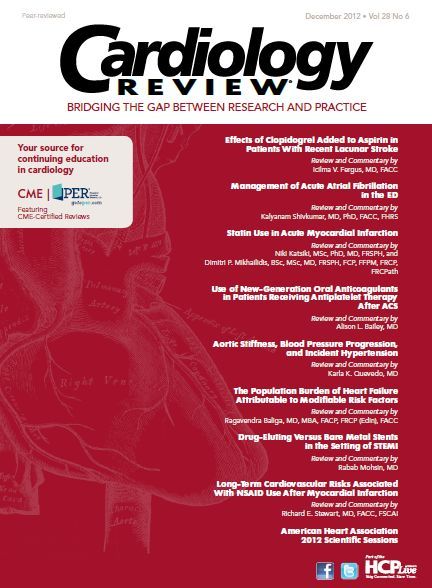The Obesity Paradox

Mike Hennessy
President, Chairman, Chief Executive Officer
Letter From the Publisher
Cardiology Review has been bringing readers regular updates on diabetes with a special series that delves into the very latest thinking on this pervasive national condition and its impact on cardiovascular health. In this issue, Peter H. Jones, MD, discusses “Is Bigger Really Better? The Obesity Paradox.” This article brings to light some intriguing information about obesity that may just cause your patients struggling with obesity to say, “Hold on a minute!” when you urge them to lose weight and take more responsibility for their overall health.
New evidence says that a higher body mass index (BMI), compared with a normal BMI, actually confers a so-called “survival benefit” in certain cases. Dr Jones reports that these cases involve patients with “end-stage renal disease, chronic heart failure, stroke, and chronic obstructive lung disease.” What kind of message does this new information send to people who need to take charge of their own lives and survival?
Fortunately, we offer an in-depth look at this paradox—with a closer look at some of the new data (see page 46) that will help to explain what physicians can conclude and offer patients in terms of guidance. Overall, the obesity epidemic is troubling on a number of levels. Why would your patients not want to reduce their weight and lead a healthier lifestyle? How many patients have you run across who simply will not accept the fact that their BMI makes them obese?
These studies may provide an excuse for individuals who should reduce their BMI, no matter what their overall health, and it places the burden on the physician to point out this obvious fact. Personal responsibility, plus guidance from their health care providers, should be in play when people look at the new reports on this “fit and fat” phenomenon. There are no easy answers, but cardiologists will want to take careful note of the conclusions drawn by Dr Jones.
As the year draws to a close, Cardiology Review provides carefully selected CME reviews and commentaries by esteemed Editorial Advisory Board members, with those
articles in the literature you will want to learn about right away. We take pride in bringing you reviews of studies just released, so you can stay on top of your practice and the latest thinking. Expect challenges with patients, such as the obese patient population and those struggling with diabetes, but know that you can rely on Cardiology Review to bring you what you need to keep current and prepared. We wish everyone a very happy and healthy new year!
Thank you for reading!
